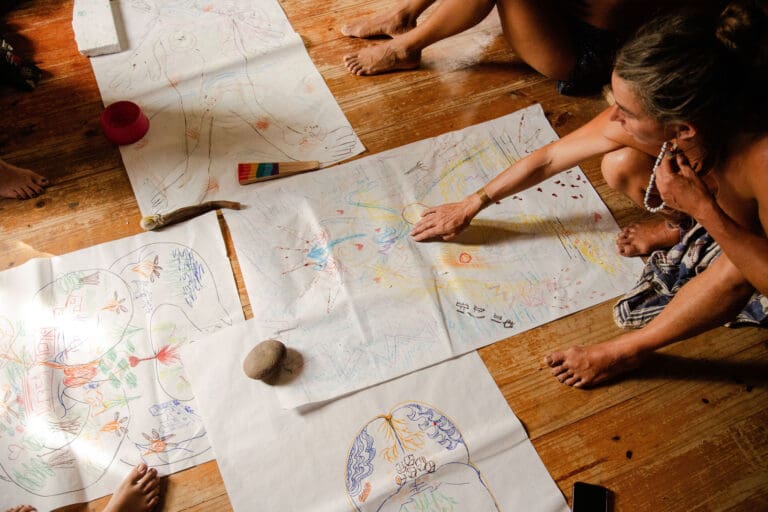In this interview, Oluwanifemi Ologunorisa, ORA’s program coordinator, had the opportunity to connect with dipti bhatnagar, an ORA Africa Fellow from the 2023 cohort. dipti’s journey is remarkable as she takes us on a journey about her roots, spanning different cultures and continents, which has been driven by her commitment to love, resilience, and justice. This interview also provides a glimpse into the power of connection and activism in dipti’s ongoing efforts to foster a humanistic society.
Who are you?
It’s such an eternal question. I am trying to delve into myself every day to figure this out. I am a cis woman from South Asia. I have been an activist for decades who wants to fight injustice at every step. But I suspect there is something more profound than all this. I am a human being who believes in love, care, joy, resilience, resistance, and ubuntu and in having a livable planet for all humans and all beings to survive and thrive. Sufi poet Rumi reminds us, ‘You are not a drop in the ocean. You are the entire ocean in a drop’. We must take this to heart and remember the vastness of the universe that we are a part of. When activism comes from love for people and the planet, I think it will be more effective.
Where are you from?
I am a diaspora child. I was born and raised in India and lived briefly in Bucharest, Romania, with my family. I was educated in California, and I am married. I have been living in Mozambique for the last 13 years. Sometimes I feel like I don’t really belong anywhere, so I made up my mind that I need to belong everywhere. Wherever love for humanity and the planet is alive, I know I can find a way to connect with people.
Share a fun fact about yourself.
When I was a child in Kolkata, India, my father was involved in producing Bengali TV serials and films. As a 10-year-old, I was roped into playing the part of a village child in one of his TV serials, based on the short stories of Indian writer Munshi Premchand. Living in British colonial India, Premchand wrote about the evils of caste, poverty, and colonialism, as well as the state of women and laborers. Hopefully, there is no copy of my childhood acting available anymore.
Both my parents did theatre, and I watched them perform in front of full auditoriums. I did theatre in school and college myself. Most memorably, while I was a student at LSR, one of the best women’s colleges in Delhi University, we performed Judith Alexa Jackson’s play called Wombmanwars about Anita Hill being sexually harassed by Clarence Thomas, who went on to become US Supreme Court Justice. I played the role of Clarence Thomas in our version of the play! I had to channel all my detestation for him into the role. Thomas continues to be a corrupt, morally bankrupt, and polarising figure in US politics even today. All that theatre training came in very handy when I needed to lead slogans loudly at protests.
Share an experience you have had in the ORA community
My favorite memory from the ORA fellowship was being in Nairobi, Kenya, for the ORA-Africa fellows meeting. I feel very grateful to be part of the group and connect with my co-fellows from across Africa. Together, we went to meet with radical feminists in Kibera, who march on the streets against femicide, openly challenge capitalism, support LGBTQ rights, take care of their families, and run small businesses for their livelihood. Some spoke of God, some of Allah, and some of atheism. Being in their presence was beautiful, humbling, and rejuvenating.
From Kibera, we went to the Ukombozi library, a word that means liberation in Swahili. The highlight of the library for me was the presence of the Kenya Palestine solidarity movement. Africans have always aligned with the Palestinian struggles. Samora Machel, the first President of Mozambique, believed strongly that our own independence was incomplete without the liberation of Palestine. Yet the injustice against Palestinians has continued for 75 years, and there is again a full-blown genocide going on in Palestine right now while the world just watches. Anti-colonial African writer Frantz Fanon wrote in 1961 about how colonialism dehumanized all people, including the colonizers. Our fight is to reclaim all of our humanity, to reclaim our ubuntu.
What projects are you currently working on?
I am currently working on understanding the barriers and bridges to a fossil fuel phase-out, leading to the co-creation of a World Commission on Fossil Fuel Phase-out. We are concerned not with whether the phase-out will happen (it needs to happen if we want a liveable planet) but with how it will happen and how we ensure the development and survival needs of countries and peoples in the global south. I care about how we hold transnational corporations accountable for their climate crimes and use this process to bring more justice and well-being to everyone.
At the same time, I am supporting my home organization, JA! Justiça Ambiental in Mozambique, on climate justice work. We stand with communities to take on the Mozambique gas project, constant land grabbing, a proposed mega-dam on the Zambezi River, and fight back against shrinking civic space.



